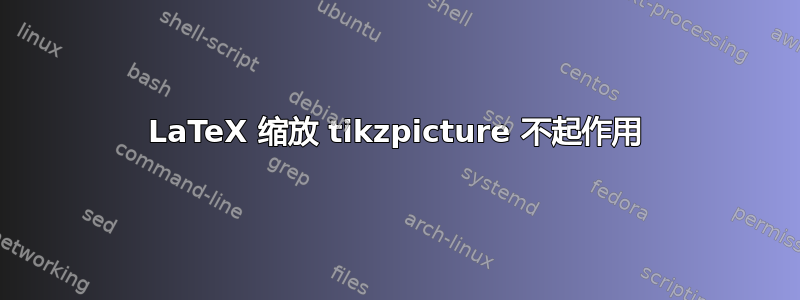
以下代码中的 TikZ 图片无法正确缩放。它与文本重叠。如果我注释掉transform canvas={scale=0.5}它,它就可以正常工作(但我想缩放所有内容)。
\documentclass{article}
\usepackage{subfig}
\usepackage{tikz}
\usepackage{graphicx}
\usetikzlibrary{calc,trees,positioning,arrows,chains,shapes.geometric,
decorations.pathreplacing,decorations.pathmorphing,shapes,matrix,shapes.symbols}
\tikzset{
>=stealth',
punktchain/.style={
rectangle,
rounded corners,
% fill=black!10,
draw=black, very thick,
text width=8em,
minimum height=3em,
text centered,
on chain},
line/.style={draw, thick, <-},
element/.style={
tape,
top color=white,
bottom color=blue!50!black!60!,
minimum width=7em,
draw=blue!40!black!90, very thick,
text width=7em,
minimum height=3.5em,
text centered,
on chain},
every join/.style={->, thick,shorten >=1pt},
decoration={brace},
tuborg/.style={decorate},
node/.style={scale=0.45},
tubnode/.style={midway, right=4pt},
}
\newcommand\schema{
\begin{tikzpicture}[node distance=.8cm, start chain=going below,transform canvas={scale=0.5}]
%\begin{tikzpicture}[node distance=.8cm, start chain=going below]
\node (preprocessing) [punktchain ] {text text};
\begin{scope}[start branch=venstre,
every join/.style={->, thick, shorten <=1pt}, ]
\node[punktchain, on chain=going left, join=by {<-}]
(landmarks) {
\begin{tabular}{l}
text \\
text \\
\end{tabular}
};
\end{scope}
\node[punktchain, join,] (potentialfunction) {
\begin{tabular}{l}
text \\
text \\
\end{tabular}
};
\node[punktchain, join,] (query) {text};
\begin{scope}[start branch=venstre,
every join/.style={->, thick, shorten <=1pt}, ]
\node[punktchain, on chain=going left, join=by {<-}]
(input) {
text };
\end{scope}
\draw[tuborg, decoration={brace}] let \p1=(preprocessing.north), \p2=(preprocessing.south) in
($(1.5, \y1)$) -- ($(1.5, \y2)$) node[tubnode] {
\begin{tabular}{l}
text \\
text \\
\end{tabular}
};
\draw[tuborg, decoration={brace}] let \p1=(potentialfunction.north), \p2=(query.south) in
($(1.5, \y1)$) -- ($(1.5, \y2)$) node[tubnode] {
\begin{tabular}{l}
text \\
text \\
\end{tabular}
};
\end{tikzpicture}
}
\begin{document}
\begin{figure}
\centering
\subfloat[1 ] { \schema }
\hspace{0.5cm}
\subfloat[2 ] { \schema }
\caption{Comparison }
\end{figure}
\end{document}
答案1
transform canvas通常应该是最后手段:它使得 TikZ 失去对节点位置的跟踪,因此造成的危害大于好处。
就你的情况而言,scale=0.5如果你让节点也可扩展,那么一个简单的方法就可以了。默认情况下,TikZ 假定你不想缩放节点,因为这会改变文本大小。你可以tikzpicture通过添加来更改此行为every node/.append style={transform shape}:

或者,你可以使用\scalebox{0.5}{ \schema }:

第一个例子的代码
\documentclass{article}
\usepackage{subfig}
\usepackage{tikz}
\usepackage{graphicx}
\usetikzlibrary{calc,trees,positioning,arrows,chains,shapes.geometric,
decorations.pathreplacing,decorations.pathmorphing,shapes,matrix,shapes.symbols}
\tikzset{
>=stealth',
punktchain/.style={
rectangle,
rounded corners,
% fill=black!10,
draw=black, very thick,
text width=8em,
minimum height=3em,
text centered,
on chain},
line/.style={draw, thick, <-},
element/.style={
tape,
top color=white,
bottom color=blue!50!black!60!,
minimum width=7em,
draw=blue!40!black!90, very thick,
text width=7em,
minimum height=3.5em,
text centered,
on chain},
every join/.style={->, thick,shorten >=1pt},
decoration={brace},
tuborg/.style={decorate},
node/.style={scale=0.45},
tubnode/.style={midway, right=4pt},
}
\newcommand\schema{
\begin{tikzpicture}[node distance=.8cm, start chain=going below,
scale=0.5, every node/.append style={transform shape}]
%\begin{tikzpicture}[node distance=.8cm, start chain=going below]
\node (preprocessing) [punktchain ] {text text};
\begin{scope}[start branch=venstre,
every join/.style={->, thick, shorten <=1pt}, ]
\node[punktchain, on chain=going left, join=by {<-}]
(landmarks) {
\begin{tabular}{l}
text \\
text \\
\end{tabular}
};
\end{scope}
\node[punktchain, join,] (potentialfunction) {
\begin{tabular}{l}
text \\
text \\
\end{tabular}
};
\node[punktchain, join,] (query) {text};
\begin{scope}[start branch=venstre,
every join/.style={->, thick, shorten <=1pt}, ]
\node[punktchain, on chain=going left, join=by {<-}]
(input) {
text };
\end{scope}
\draw[tuborg, decoration={brace}] let \p1=(preprocessing.north), \p2=(preprocessing.south) in
($(1.5, \y1)$) -- ($(1.5, \y2)$) node[tubnode] {
\begin{tabular}{l}
text \\
text \\
\end{tabular}
};
\draw[tuborg, decoration={brace}] let \p1=(potentialfunction.north), \p2=(query.south) in
($(1.5, \y1)$) -- ($(1.5, \y2)$) node[tubnode] {
\begin{tabular}{l}
text \\
text \\
\end{tabular}
};
\end{tikzpicture}
}
\begin{document}
\begin{figure}
\centering
\subfloat[1 ] { \schema }
\hspace{0.5cm}
\subfloat[2 ] { \schema }
\caption{Comparison }
\end{figure}
\end{document}
第二个示例的代码
\documentclass{article}
\usepackage{subfig}
\usepackage{tikz}
\usepackage{graphicx}
\usetikzlibrary{calc,trees,positioning,arrows,chains,shapes.geometric,
decorations.pathreplacing,decorations.pathmorphing,shapes,matrix,shapes.symbols}
\tikzset{
>=stealth',
punktchain/.style={
rectangle,
rounded corners,
% fill=black!10,
draw=black, very thick,
text width=8em,
minimum height=3em,
text centered,
on chain},
line/.style={draw, thick, <-},
element/.style={
tape,
top color=white,
bottom color=blue!50!black!60!,
minimum width=7em,
draw=blue!40!black!90, very thick,
text width=7em,
minimum height=3.5em,
text centered,
on chain},
every join/.style={->, thick,shorten >=1pt},
decoration={brace},
tuborg/.style={decorate},
node/.style={scale=0.45},
tubnode/.style={midway, right=4pt},
}
\newcommand\schema{
\begin{tikzpicture}[node distance=.8cm, start chain=going below]
%\begin{tikzpicture}[node distance=.8cm, start chain=going below]
\node (preprocessing) [punktchain ] {text text};
\begin{scope}[start branch=venstre,
every join/.style={->, thick, shorten <=1pt}, ]
\node[punktchain, on chain=going left, join=by {<-}]
(landmarks) {
\begin{tabular}{l}
text \\
text \\
\end{tabular}
};
\end{scope}
\node[punktchain, join,] (potentialfunction) {
\begin{tabular}{l}
text \\
text \\
\end{tabular}
};
\node[punktchain, join,] (query) {text};
\begin{scope}[start branch=venstre,
every join/.style={->, thick, shorten <=1pt}, ]
\node[punktchain, on chain=going left, join=by {<-}]
(input) {
text };
\end{scope}
\draw[tuborg, decoration={brace}] let \p1=(preprocessing.north), \p2=(preprocessing.south) in
($(1.5, \y1)$) -- ($(1.5, \y2)$) node[tubnode] {
\begin{tabular}{l}
text \\
text \\
\end{tabular}
};
\draw[tuborg, decoration={brace}] let \p1=(potentialfunction.north), \p2=(query.south) in
($(1.5, \y1)$) -- ($(1.5, \y2)$) node[tubnode] {
\begin{tabular}{l}
text \\
text \\
\end{tabular}
};
\end{tikzpicture}
}
\begin{document}
\begin{figure}
\centering
\subfloat[1 ] { \scalebox{0.5}{\schema} }
\hspace{0.5cm}
\subfloat[2 ] { \scalebox{0.5}{\schema} }
\caption{Comparison }
\end{figure}
\end{document}


